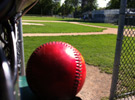Chapter Synopses
Chapter 1: Home Court Advantage
This is the story of brotherhood, and in one surprising turn of events that “explodes off the page,” of sisterhood on the basketball court. It speaks of the dignity of forcing a stronger opponent to the top of their game. It happens first when a group of college boys is challenged to a game of pickup basketball against the university’s women’s varsity team in an empty gym. It happens again when my college roommate and I wander into a tough neighborhood in Boston to play ball, and are challenged to the game of our lives and the lesson of a lifetime about black and white in America.
Chapter 2: Thanksgiving Football
This is the most poignant piece, my emphatic endorsement of backyard sports as an emollient for life’s genuine miseries. Several years ago, my family befriended a single mother from a nearby city, a refugee from the despoiled African country of Burundi. She has five children ranging in age from three to seventeen. Her husband was killed in the thirty-year genocide in her home country. For the past few years, we have welcomed them into our house for a meal on Thanksgiving Day. After the meal, we careen out to the backyard to play soccer (Football), which is the national sport of Burundi. The story is my astonishment at what this family has been through, and how much they recapture during our Thanksgiving Football games.
Chapter 3: The Season
This story redirects Al Michael’s famous call of the 1980 Olympic hockey triumph to every sandlot where baseball has ever been played. Told as if it were a narrative (sometimes even a telecast) of a major league ball club rising from its own ashes, this story follows an unlikely group of coed softball players through a routine season of triumph and pathos that culminates in an impossible playoff story against the unbeatables, and the season’s final few seconds … “Do you believe in Miracles?”
Chapter 4: Magic Ball
 I have been coaching Little League baseball in my town for the past seven years. I have learned that nothing motivates kids to accomplish things beyond their wildest dreams more than a small, shiny, round object. After every game, I award the game ball to a deserving player – a common tradition in many sports. But this ball is not for the best hit, the most spectacular play, or the finest pitching. It is for character, and it is the best $3.99 I have ever spent.
I have been coaching Little League baseball in my town for the past seven years. I have learned that nothing motivates kids to accomplish things beyond their wildest dreams more than a small, shiny, round object. After every game, I award the game ball to a deserving player – a common tradition in many sports. But this ball is not for the best hit, the most spectacular play, or the finest pitching. It is for character, and it is the best $3.99 I have ever spent.
Chapter 5: The Timing Pattern
My father was a star quarterback in high school, and led his midwestern team to its only undefeated season in school history, a record that still stands today. I was not a quarterback, because desire can only offset physique so much. But I learned. This story traces a group of engineering students who had never played organized football through an intramural season against guys who had. On the brink of the unthinkable, it culminates in a final play that tests the limit of unspoken synchronicity.
Chapter 6: Swing ... and a Drive!
As a kid, I was the only boy on my baseball teams never to strike out, and also the only boy never to hit a homerun. This story recounts the end of these streaks, which lasted well into adulthood, by weaving them seamlessly into the history of monumental major league homeruns (and strikeouts), without ever distinguishing between the different levels of the game.
Chapter 7: All In
Several years before completing the manuscript for this book, I met an eleven-year old boy while supervising the tryouts for our town’s spring Little League season. He had taken two years off from baseball, and from all other sports and activities. His choice, at that young age, was how to handle illness in his family – not how to cope, but how to lead. After two years, he returned to the normal life of a pre-teen boy, playing music, playing sports, playing video games. He and his Mother asked me how he would fit in on his team after his absence from the game. The answer to this question is the one that brings tears to my eyes whenever I reminisce, and I knew that with his story, this book was complete.
